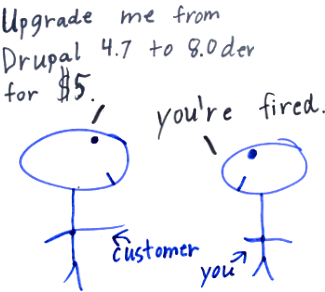During a business strategy BOF at DrupalCon Denver, I suggested to the gathered freelance-types that they should fire bad customers. The reaction was immediate, visceral, and hostile! As I slowly backed toward the door I explained to 50 pairs of angry-eyes that firing ill-fitting, high-maintenance customers is a necessity advocated in many business books. They were having none of it and I slipped out just before I was hook_user_deleted on the spot. Clearly I'd hit a nerve; this is something that needs to be discussed more in our community.
I read an interesting blog post titled "Why Cheap Customers Cost More", in which web designer Sacha Greif explained why customers who buy lower-priced services have high support needs. The article postulates that low-price offers attract "dumb" customers (his word, not mine). Not dumb as in unintelligent but ignorant about the products being purchased so they make a decision based on the only thing they do understand: the price.
On the surface, this rings true, but ultimately I disagree. At Volacci, certain low-priced customers DO tend to have higher needs. However, it's not because of ignorance. We have "less informed" customers at all price points that are wonderful customers because we've earned their trust. In fact, some of our most successful, lowest-maintenance customers fall into this category. We call them "B" customers.
"A" customers are ideal. They have a deep understanding of what we do — and we are invited to have a deep understanding of their business as well. They are already successful and we make them more so by helping them craft business strategy, not just execute a marketing campaign. The value to them is extremely high as our campaigns are more powerfully focused on their highest business needs. These customers frequently refer their colleagues at other businesses to us.
 Then, there are "C" customers. We've learned to recognize them and eject them from our sales funnel before they can become customers. See if you recognize any of these:
Then, there are "C" customers. We've learned to recognize them and eject them from our sales funnel before they can become customers. See if you recognize any of these:
- Know-it-alls. These customers consider themselves experts and just can't see the value in paying for our expertise. They don't want a master carpenter; they want a hammer. They dictate, in excruciating detail, how everything is going to be done; ignoring proven technique, leaving out important steps, and casting blame when the results don't come. The danger of widespread online knowledge is that it makes expertise seem cheap. What Mr. Know-it-all doesn't realize is that just because he read it online doesn't mean that it's true; doesn't mean that it applies to his situation; and it certainly doesn't mean that it's the best possible way. (Think about this the next time you use your iPhone to self-diagnose an illness while sitting in your doctor's waiting room.) I love Treehouse Agency's old slogan: "Relax. We've done this before."
- There are the impecunious customers who simply can't afford to pay more. That's because they're not successful. If they were successful, they would know the value and have the funds to pay more. The conundrum is that we Drupal shops sell products that make people more successful. (Like web design, SEO, training, etc.) These customers bank on us turning their failures into success. The necessary outcome for them to feel okay about the purchase is far higher than we can possibly deliver. Not only that, they are highly emotionally attached to the outcome so they freak about every perceived hiccup. Taking someone from "not successful" to "successful" is very, very expensive and it's those people that can least afford it. (To take someone from successful to very successful is cheap by comparison. And they can afford to pay — and appreciate the value.)
- Then there are the professional frog-boilers — the most expensive customers of all — the ones who never stop negotiating all through the project. No matter what level of service we sign them up for, they are going to slowly scope-creep the margin right out of the contract. The red flag for us is if they want to change every little thing in the contract then they'll want to change every little thing about the project. They resemble the know-it-alls, but the difference is they will tell us how good we are, how right we are, and how, if only we would tweak this or do a little more that, it would be perfect. Then they call again the next day and take a little more. Slowly but surely, they boil the frog.
Servicing even one of these "C" customers costs more than profit; it brings down team morale and prevents us from serving our "A" customers even better. From time to time, we re-evaluate our entire customer list and occasionally fire a "C" customer who slipped through. We do it professionally, face-to-face if possible or on the phone if not (never, ever in an email!). We're kind, refer them to another provider, and help them transition over a two-to-three month period of time. Everyone wins!
The question for you is, who are your least profitable customers? If you don't know, try making a list of all the customers you've had over the last 12-24 months. Rank them from best to worst. Where do you draw the lines between A/B and B/C customers? Why? Yours will be different from mine, and it's imperative that you know the difference.
Finally, do you still have any active "C" customers? If so, consider the cost, and then do the right thing. As painful as it can be, it's ultimately better for your business — and better for them.
Drawing by Andrew Finklea

Comments
Thanks for writing that down. Refusing customers is an option. It wasn't that clear to me till I read it. When you're finally breaking through as a small webshop, this should be one of the first luxuries to permit yourself.
Beware of potential customers that:
- don't have a website already
- want you to make a website with text and images they still have to produce
- start their business
- don't want to make an advance payment
- don't free one of their staff members for the new website (webmaster)
- come with a complicated plan.
@lolandese : Yes, you got it. First, get out of the bad relationship and don't get back into another one! We looked for criteria about our ideal customers that we could know before we spent much time selling to them. Selling is a huge expense so we looked for things that HAD to be there. For us, it was a higher bar. For example, from your list, it would be difficult or impossible to know if they had the text and images already (customers lie), or if they aren't going to have a webmaster on the project when it's all done (best of intentions but...). Or, possibly, if the plan is overly complex. I've found that entrepreneurs just starting out invariably think that their plan is simple, creating content is easy (and fast), and they'll have the money to hire a webmaster by the time you get the site launched. Those things are almost never true in the end. However, it's easy to see if someone doesn't have a website already or if their business is new. You can know those quickly with a Google search.
As with anything, test your theory and refine your process. It's not about getting it right - it's about putting a self-improving system in place that will continuously improve over time. What's right about sales today wasn't 5 years ago (hello LinkedIn). Keep living the dream!
Just to add another point to the above list. Beware of potential customers that:
- don't have access to their Domain Name Server (DNS).
A not cooperating former web developer that has put the domain on his own name instead of the client's can be frustrating to deal with. Only last month alone we had to create a sub-domain for two of our customers of the type wvw.example.com (note the V between the W's) with a redirect from their official domain (if you can at least access the server where the old site is hosted). It's the most ugly workaround I can think of (pretty severe SEO consequences), but sometimes the only way to pull a project ahead till the domain expires or a name change is accepted.
We already have this situation covered with our Terms & Conditions, but most customers think they have access to it, but confuse the site hosting with the DNS.
Spot on - I'm just shocked that that a room with 50 freelancers wouldn't have a handful that would understand right off the bat.